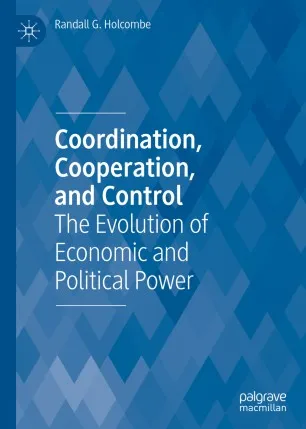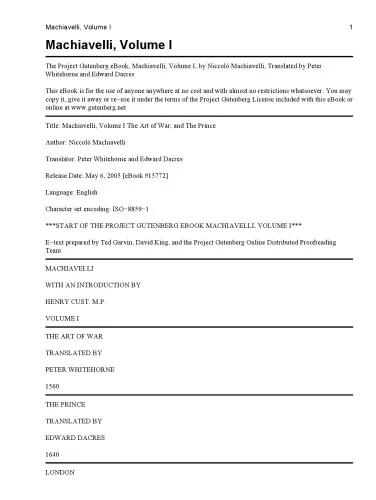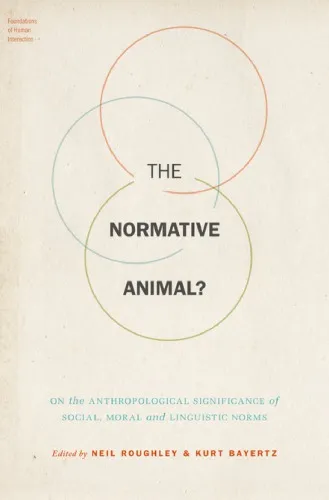Coordination, Cooperation, and Control: The Evolution of Economic and Political Power
4.5
بر اساس نظر کاربران

شما میتونید سوالاتتون در باره کتاب رو از هوش مصنوعیش بعد از ورود بپرسید
هر دانلود یا پرسش از هوش مصنوعی 2 امتیاز لازم دارد، برای بدست آوردن امتیاز رایگان، به صفحه ی راهنمای امتیازات سر بزنید و یک سری کار ارزشمند انجام بدینکتاب های مرتبط:
معرفی کتاب: هماهنگی، همکاری و کنترل: تکامل قدرت اقتصادی و سیاسی
کتاب "Coordination, Cooperation, and Control: The Evolution of Economic and Political Power" نوشته رندال جی. هولکومب، اثری عمیق و جامع است که به بررسی نقش کلیدی هماهنگی و همکاری در شکلگیری ساختارهای اقتصادی و سیاسی میپردازد. این کتاب بر تکامل قدرت اقتصادی و سیاسی متمرکز است و تغییرات بلندمدت آن را در نظامهای مختلف سیاسی و اقتصادی تحلیل میکند.
هولکومب با استفاده از مفاهیم اقتصادی پیشرفته، از جمله Public Choice Theory و Economic Evolution، روندی را ترسیم میکند که طی آن جوامع انسانی از ساختارهای ابتدایی به سازمانهای پیچیدهتر تغییر پیدا کردهاند. این کتاب بهطور خاص به این موضوع میپردازد که چگونه سازمانها از سه مفهوم اصلی هماهنگی، همکاری و کنترل برای مدیریت تصمیمگیریهای اقتصادی و سیاسی استفاده میکنند. نویسنده نشان میدهد که چگونه این مکانیزمها نه تنها بر پویایی قدرت تأثیر میگذارند، بلکه میتوانند موجب بروز فرصتها و چالشهای جدیدی در حکومتداری و توسعه اقتصادی شوند.
در ادامه، به شرح تفصیلی بخشهای مختلف این شاهکار علمی و دلایلی که این کتاب را به یکی از منابع مهم برای دانشجویان، سیاستگذاران و فعالان اقتصادی تبدیل کرده است، میپردازیم.
خلاصهای از محتوای کتاب
کتاب "Coordination, Cooperation, and Control" از سه بخش اصلی تشکیل شده است که هر بخش به تفصیل به یکی از موضوعات کلیدی یعنی هماهنگی، همکاری و کنترل در رابطه با اقتصاد و سیاست میپردازد.
- هماهنگی: در این بخش، نویسنده توضیح میدهد که چگونه بازارها بهعنوان یک مکانیزم هماهنگکننده عمل میکنند. نقش قیمت بهعنوان سیگنالی برای تخصیص منابع به طور عمیق مورد بحث قرار گرفته است و اهمیت هماهنگی اقتصادی در توسعه پایدار روشن میشود.
- همکاری: هولکومب در این مبحث تمرکز خود را بر نهادهایی میگذارد که همکاری میان افراد و گروهها را تسهیل میکنند. او نشان میدهد که چگونه نهادهای سیاسی، قراردادها و قوانین، ابزارهایی برای تسهیل همکاری در جوامع پیچیده هستند.
- کنترل: در آخرین بخش از کتاب، مفهوم کنترل و نقش آن در توزیع قدرت بررسی میشود. نویسنده بیان میکند که چگونه تمرکز یا پراکندگی کنترل میتواند نتایج اقتصادی و سیاسی متفاوتی به همراه داشته باشد.
درسهای کلیدی از کتاب
- هماهنگی اقتصادی بهعنوان یک مکانیزم طبیعی توسط بازارها تسهیل میشود؛ درحالیکه عملکرد موفق آن به صیانت از حقوق مالکیت نیازمند است.
- همکاری میان افراد در گروهها به ساختارهای نهادی نیازمند است که شفافیت و انصاف را تضمین کنند.
- تمرکز بیش از حد قدرت میتواند به اختلالات جدی در نظامهای سیاسی و اقتصادی منجر شود، درحالیکه توزیع قدرت میتواند نوآوری را افزایش دهد.
جملات معروف از کتاب
برخی از جملات قابل تأمل از این کتاب ارزشمند عبارتند از:
"Markets are not just mechanisms for exchange; they are systems of coordination that reflect the decentralized decisions of countless individuals."
"Power, whether political or economic, is a tool that must be controlled, lest it controls us."
چرا این کتاب اهمیت دارد؟
کتاب "Coordination, Cooperation, and Control" نه تنها یک اثر تئوریک قابل توجه است، بلکه به دلیل کاربرد مفاهیم خود در دنیای واقعی، از ارزش بالایی برخوردار است. برای سیاستگذاران، این اثر ابزاری است برای درک چگونگی ایجاد نهادهایی که عدالت و کارایی را تضمین میکنند. همچنین برای دانشجویان اقتصاد و علوم سیاسی، این کتاب پنجرهای را به سوی پیچیدگیها و تعاملات میان پیشرفتهای اقتصادی و سیاسی باز میکند.
این کتاب با روشنسازی ارتباط میان هماهنگی اقتصادی، همکاری جمعی و کنترل قدرت، به درک بهتر دینامیکهای جوامع انسانی کمک کرده و راهکارهایی عملی برای گرهگشایی از چالشهای پیشرو ارائه میدهد.
Introduction to "Coordination, Cooperation, and Control: The Evolution of Economic and Political Power"
In "Coordination, Cooperation, and Control: The Evolution of Economic and Political Power," author Randall G. Holcombe explores the intricate dynamics of power, governance, and the interconnected processes that drive societal and institutional development. This book carefully examines the progression of economic systems and political organizations, illustrating how these forces interact to create cohesive structures and mechanisms that sustain human society. It provides an in-depth understanding of the underlying principles of coordination, the necessity of cooperation, and the exertion of control, illuminating their roles in shaping both economic and political landscapes.
Randall G. Holcombe offers readers a compelling analysis of the historical journey of economic and political systems, beginning with fundamental human interactions and culminating in the sophisticated institutional frameworks we see today. Far from being linear, this evolution reflects a series of adaptive strategies aimed at solving coordination problems, fostering cooperation, and managing resources and information. The book's interdisciplinary approach highlights the interplay between individual choice, collective decision-making processes, and structural power.
This introduction aims to set the stage for a deeper exploration of the book’s core themes while offering an accessible and engaging guide for readers interested in economics, politics, and the evolution of social power.
Summary of the Book
The central premise of the book revolves around the interaction of three key components: coordination, cooperation, and control. Randall G. Holcombe meticulously dissects these elements, demonstrating how they serve as the foundation for both economic systems and political authority.
The book begins with an exploration of how human societies historically solved coordination problems, starting with small, tribal groups. These groups often relied on informal coordination mechanisms based on trust and kinship. As societies grew more complex, new challenges emerged that required more formalized systems of cooperation. The creation of markets and governments became essential structures to manage resources and mediate conflicts.
Holcombe delves into the evolution of these institutions by examining the dual role of economic power and political power. While markets tend to rely on voluntary exchange and mutual benefit, political systems often employ coercive powers to enforce decisions. The book discusses the balance between these two forces and their complementary roles in maintaining order and promoting societal progress.
Key case studies and historical examples are presented throughout the book, linking theoretical arguments with real-world applications. These examples serve to illustrate how societies innovate and adapt over time, overcoming challenges through iterative processes of learning and adjustment.
Key Takeaways
- Coordination, cooperation, and control are interdependent forces that underpin societal organization.
- Economic power and political power are distinct but closely linked, shaping the trajectory of human progress.
- Institutions are adaptive structures that evolve in response to environmental and societal challenges.
- The balance between voluntary exchange and coercive authority is critical to fostering long-term stability and growth.
- Understanding the historical evolution of these systems can offer insights into current economic and political dynamics.
Famous Quotes from the Book
“Coordination is the glue that binds individuals together in a web of mutual dependence, enabling them to achieve together what they could never accomplish alone.”
“Cooperation emerges not from the absence of conflict, but from the ability to resolve it constructively, creating systems that prioritize shared goals.”
“Control is a double-edged sword: it is necessary to maintain order but can stifle innovation and progress if wielded too heavily.”
“The evolution of institutions reveals the ingenuity of human societies in adapting to complex challenges and seizing opportunities for growth.”
Why This Book Matters
"Coordination, Cooperation, and Control" is more than just an academic exploration of societal structures. It is an essential read for anyone looking to understand the mechanisms that govern the world around them. The insights provided by Randall G. Holcombe are profoundly relevant in today’s rapidly changing global environment, where understanding the balance between economic and political power is more critical than ever.
The book equips readers with analytical tools to examine modern institutions and their broader implications. It also inspires a deeper appreciation for the historical forces that have shaped contemporary society. By understanding how coordination, cooperation, and control interact in economic and political arenas, readers gain a clearer perspective on key issues such as governance, resource allocation, and conflict resolution.
Whether you are a student, a policymaker, or simply a curious reader, this book provides a comprehensive framework to make sense of the evolving dynamics of power and progress. Its relevance transcends academic boundaries, offering practical insights for addressing the challenges of today and tomorrow.
دانلود رایگان مستقیم
شما میتونید سوالاتتون در باره کتاب رو از هوش مصنوعیش بعد از ورود بپرسید
دسترسی به کتابها از طریق پلتفرمهای قانونی و کتابخانههای عمومی نه تنها از حقوق نویسندگان و ناشران حمایت میکند، بلکه به پایداری فرهنگ کتابخوانی نیز کمک میرساند. پیش از دانلود، لحظهای به بررسی این گزینهها فکر کنید.
این کتاب رو در پلتفرم های دیگه ببینید
WorldCat به شما کمک میکنه تا کتاب ها رو در کتابخانه های سراسر دنیا پیدا کنید
امتیازها، نظرات تخصصی و صحبت ها درباره کتاب را در Goodreads ببینید
کتابهای کمیاب یا دست دوم را در AbeBooks پیدا کنید و بخرید
1367
بازدید4.5
امتیاز0
نظر98%
رضایتنظرات:
4.5
بر اساس 0 نظر کاربران
Questions & Answers
Ask questions about this book or help others by answering
No questions yet. Be the first to ask!














